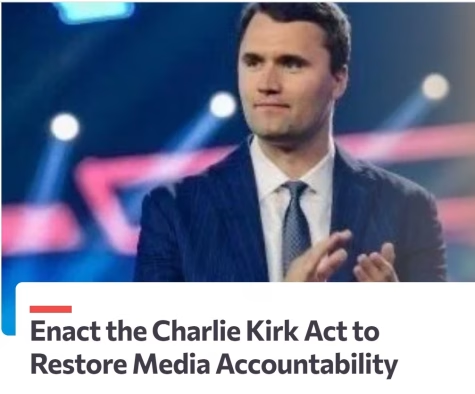
The assassination of conservative activist Charlie Kirk has ignited a political and cultural firestorm, exposing fault lines between the media, grassroots conservatives, and national leaders. At the heart of this convergence is President Trump’s amplification of a viral petition calling for sweeping reforms in media accountability—dubbed the “Charlie Kirk Act”—and the raw, unfiltered response of Real America’s Voice correspondent Ben Bergquam, who blames the press for fanning the flames that led to his friend’s death.
Bergquam, host of Law and Border, has built his reputation on the frontlines of immigration reporting. His work has been promoted and defended by law enforcement officers, ICE officials, lawmakers, and Tom Homan. Even President Trump has reposted Bergquam’s border coverage on Truth Social. But last week, the Chicago Sun-Times targeted Bergquam in a dismissive profile, labeling him a mere “personality” rather than acknowledging his role as a credentialed journalist. The outlet’s framing triggered Bergquam’s sharp rebuttal online:
“No wonder I’ve been getting more death threats from the demonic left than usual. Thanks @Suntimes for proving my point. It’s leftist activist outlets like this that are part of the problem, pretending to be news when in reality they’re just mouthpieces for the Marxist hate machine. Charlie Kirk is dead today in part because of organizations like them!”
His comments expose a sentiment gaining traction among conservatives: mainstream media outlets are not only biased but actively complicit in creating conditions that put lives at risk. Bergquam’s remarks drew immediate attention, not least because they coincided with President Trump’s own endorsement of a video message calling for legislative action to rein in the press.
That message, now circulating widely with a petition on Change.org, outlines the proposed “Charlie Kirk Act.” The act’s supporters argue that Kirk’s assassination was the tragic endpoint of years of reckless media smears and baseless accusations.
The petition calls for a modern revival of the Smith-Mundt Act, originally designed to prevent government propaganda from reaching domestic audiences. Reimagined for today, the Charlie Kirk Act would hold media outlets, educators, and online platforms accountable for knowingly spreading misinformation or defamatory narratives.
Among its most striking provisions: severe financial penalties for social media companies that censor political speech unfairly, with fines amounting to 35% of corporate valuation for violations. It also seeks to criminalize reckless labeling—such as branding individuals “racist” or “fascist” without evidence—that damages reputations and endangers lives.
President Trump’s repost of the message signals that the debate is no longer confined to conservative media circles. It has broken into the national conversation, framing media accountability as a core campaign issue heading into 2026. Trump’s endorsement not only validated the grief of Kirk’s supporters but also positioned the former president as a champion for those demanding structural change in how the press operates.
The convergence of Bergquam’s outcry and Trump’s amplification suggests a broader realignment: conservatives are moving beyond complaints about media bias toward concrete proposals for punitive action against outlets they deem complicit in political violence. Whether the Charlie Kirk Act gains legislative traction remains to be seen. But the moment has crystallized a central question for America’s future: will the media remain untouchable, or has Kirk’s death ushered in an era of real accountability?
For more context about the media’s role in promoting propaganda, consider this flashback to when Naomi Wolf exposed the reality of a lying media:
Please see our coverage of Bergquam’s work:
